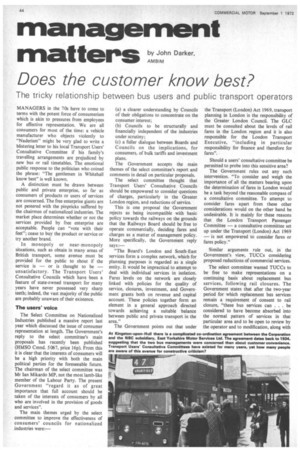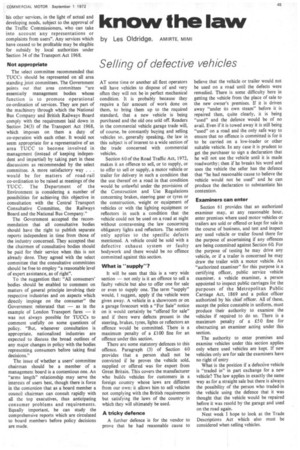management matters
Page 50

Page 51

If you've noticed an error in this article please click here to report it so we can fix it.
by John Darker, AMBIM
Does the customer know best?
The tricky relationship between bus users and public transport operators
MANAGERS in the 70s have to come to terms with the potent force of consumerism which is akin to pressures from employees for effective representation. We are all consumers for most of the time: a vehicle manufacturer who objects violently to "Naderism" might be very glad to write a blistering letter to his local Transport Users' Consultative Committee if his family's travelling arrangements are prejudiced by new bus or rail timetables. The emotional public response to the politician who coined the phrase: "The gentlemen in Whitehall know best" is well known.
A distinction must be drawn between public and private enterprise, so far as consumers of products or users of services are concerned. The free enterprise giants are not pestered with the pinpricks suffered by the chairmen of nationalized industries. The market place determines whether or not the services provided by free enterprise are acceptable. People can "vote with their feet"; cease to buy the product or service or try another brand.
In monopoly or near-monopoly situations, such as obtain in many areas of British transport, some avenue must be provided for the public to shout if the service is — or is thought to be — unsatisfactory. The Transport Users' Consultative Councils which have been a feature of state-owned transport for many years have never possessed very sharp teeth; indeed, the vast majority of the public are probably unaware of their existence.
The users' voice The Select Committee on Nationalized Industries published a massive report last year which discussed the issue of consumer representation at length. The Government's reply to the select committee's main proposals has recently been published (HMSO Cmnd. 5067, price 16p). From this it is clear that the interests of consumers will be a high priority with both the main political parties for the foreseeable future. The chairman of the select committee was Mr Ian Mikardo MP, not the most lamb-like member of the Labour Party. The present Government "regard it as of great importance that full account should be taken of the interests of consumers by all who are involved in the provision of goods and services".
The main themes urged by the select committee to improve the effectiveness of consumers' councils for nationalized industries were:— (a) a clearer understanding by Councils of their obligations to concentrate on the consumer interest; (b) Councils to be structurally and financially independent of the industries under scrutiny; (c) a fuller dialogue between Boards and Councils on the implications, for consumers, of bulk tariffs and investment plans.
The Government accepts the main themes of the select committee's report and comments in detail on particular proposals.
The select committee thought that Transport Users' Consultative Councils should be empowered to consider questions of charges, particularly in the Greater London region, and reductions of service.
This is one proposal the Government rejects as being incompatible with basic policy towards the railways on the grounds that the Railways Board should be free to operate commercially, deciding fares and charges as a matter of management policy. More specifically, the Government reply says:—
"The Board's London and South-East services form a complex network, which for planning purposes is regarded as a single entity. It would be impractical to attempt to deal with individual services in isolation. Fares levels on the network are closely linked with policies for the quality of service, closures, investment, and Government grants both on revenue and capital account. These policies together form an element in a general approach directed towards achieving a suitable balance between public and private transport in the area."
The Government points out that under the Transport (London) Act 1969, transport planning in London is the responsibility of the Greater London Council. The GLC must be consulted about the levels of rail fares in the London region and it is also responsible for the London Transport Executive, "including in particular responsibility for finance and therefore for fares".
Should a users' consultative committee be permitted to probe into this sensitive area?
The Government rules out any such intervention. "To consider and weigh the importance of all the matters bearing upon the determination of fares in London would be a task beyond the reasonable compass of a consultative committee. To attempt to consider fares apart from these other considerations would on the other hand be undesirable. It is mainly for these reasons that the London Transport Passenger Committee — a consultative comniittee set up under the Transport (London) Act 1969 — is not empowered to consider fares or fares policy."
Similar arguments rule out, in the Government's view, TUCCs considering proposed reductions of commercial services.
The select committee wanted TUCCs to be free to make representations on a continuing basis about replacement bus services, following rail closures. The Government states that after the two-year period for which replacement bus services remain a requirement of consent to rail closure, "these bus services can . . . be considered to have become absorbed into the normal pattern of services in that particular area and to be open to review by the operator and to modification, along with his other services, in the light of actual and developing needs, subject to the approval of the Traffic Commissioners, who can take into account *any representations or complaints from users". Any services which have ceased to be profitable may be elegible for subsidy by local authorities under Section 34 of the Transport Act 1968.
Not appropriate The select committee recommended that TUCCs should be represented on area standing joint committees. The Government points out that area committees "are essentially management bodies whose function is to promote operational co-ordination of services. They are part of the machinery through which the National Bus Company and British Railways Board comply with the requirement laid down in Section 24(3) of the Transport Act 1968, which imposes on them a duty of co-operation with each other. It would not seem appropriate for a representative of an area TUCC to become involved in management (instead of keeping independent and impartial) by taking part in these discussions as recommended by the select committee. A more satisfactory way . . . would be for matters of road-rail co-ordination to be raised at meetings of the TUCC. The Department of the Environment is considering a number of possibilities for achieving this objective in consultation with the Central Transport Consultative Committee,, the Railways Board and the National Bus Company."
The Government accepted the recommendation that all consultative bodies should have the right to publish separate reports independent in time from those of the industry concerned. They accepted that the chairmen of consultative bodies should be paid for their service when this is not already done. They agreed with the select committee that the consultative committees should be free to employ "a reasonable level of expert assistance, as of right".
To the suggestion that "All consumers' bodies should be enabled to comment on matters of general principle involving their respective industries and on aspects which directly impinge on the consumer" the Government reiterated that — as in the example of London Transport fares — it was not always possible for TUCCs to comment usefully on some questions of policy. "But, whenever consultation is appropriate, nationalized industries are expected to -discuss the broad outlines of any major changes in policy with the bodies representing consumers before taking final decisions."
The issue of whether a users' committee chairman should be a member of a management board is a contentious one. An "arms length" relationship may serve the interests of users best, though there is force in the contention that as a board member a council chairman can consult rapidly with all the top executives, thus anticipating consumer problems and requirements. Equally important, he can study the comprehensive reports which are circulated to board members before policy decisions are made.


































































































